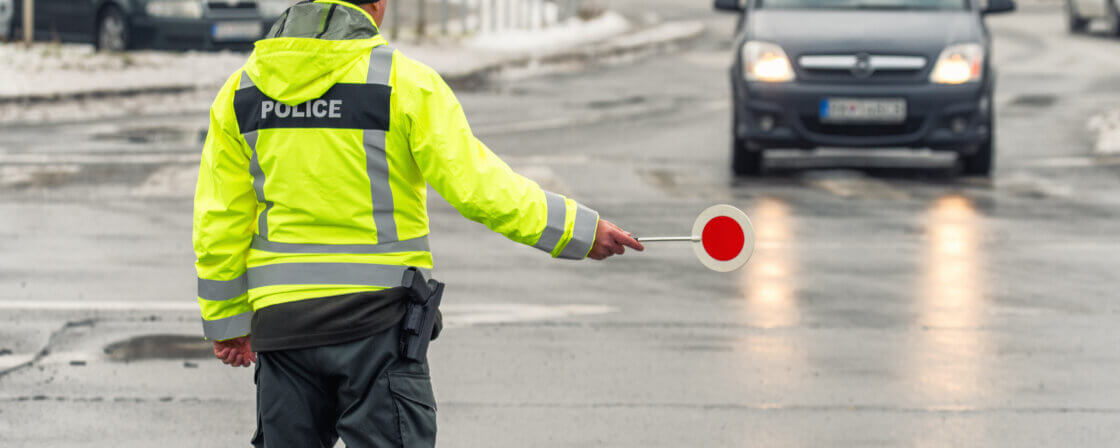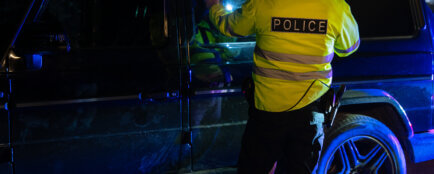Who is allowed to measure speed and how the measurement is done
Only those legally authorised to do so may measure the speed of vehicles. These are mainly the Police of the Czech Republic and the municipal police. Speed measurement by other persons (e.g. crime prevention assistants) is legally irrelevant. If someone other than a police officer claims to have “measured your speed”, this is not evidence that can stand up in administrative proceedings.
Therefore, only police and municipal police officers are authorized to measure your speed. If someone else, such as a private security service, measures your speed, the results of that measurement carry no legal weight.
Measurements are carried out in various ways. The most common is a stationary radar on poles, which reads the speed of passing cars, or a section measurement, which evaluates the average speed between two points. Police officers also often use hand-held laser guns. It is important that each device has a valid calibration – without it, the measurement is questionable. If a driver discovers that a measurement has been taken using an uncalibrated device, they can effectively defend themselves.
The basic distinction that the Road Traffic Act makes is between speeding in a municipality and speeding outside a municipality. In a municipality, the protection of pedestrians and local residents is a priority, and therefore the penalties are much stricter.
__service:
Overview of speeding fines and points
Instead of a dry table, let’s look at the different situations that drivers encounter most often:
Speeding 20 km/h over the speed limit in a municipality (30 km/h outside the municipality): a fine of CZK 1,500 to 2,500 and 4 points. The driver often doesn’t even realise it, just speed up when turning or going downhill.
Speeding 30 km/h over the speed limit in a village (40 km/h outside the village): this is a more serious offence. A fine of 2,500 on the spot and 4,000-10,000 CZK in administrative proceedings. 4 points. In some cases there is also a risk of driving ban.
Speeding 40 km/h in a municipality (50 km/h outside a municipality): 5,000-10,000 CZK fine, driving ban for 6-12 months and 6 points. This is the point where the penalty becomes really severe. A driver who drives, for example, 90 km/h where 50 is allowed can no longer plead inattention.
Speeding on the motorway: If a driver drives, for example, 160 km/h instead of the permitted 130 km/h, he will usually receive a fine of between CZK 1,500 and 2,500 and 4 points. But if he exceeds the limit by 50 km/h or more, he can also face a driving ban for 6 to 12 months, 6 points and a fine of CZK 45,000 to 10,000.
Importantly, the amount of the penalty always depends on the specific situation and the assessment of the police or administrative authority.
What is the risk of repeated speeding
While a first speeding offence is usually dealt with by a fine and points, repeat offences are dealt with much more severely. If a driver commits repeated speeding offences (for example, several times in one year), he or she may lose his or her licence for a longer period of time.
If a driver drives 80 km/h in a municipality, he/she will receive a fine and points. But once the police catch him again in a month for a similar offence, the administrative authority may already decide to ban him from driving because he is a repeat offender.
Repeated speeding is seen as a sign that the driver is ignoring the rules and posing a risk to other road users.
Tip for article
Tip: Have you had your licence suspended? In our article you will find out when the police can suspend your licence, when it will be returned to you and how you can defend yourself.
Is speeding an offence or a criminal offence?
Speeding is overwhelmingly “just” an offence. However, in combination with other circumstances, for example if a driver causes an accident with serious consequences, his or her actions may be considered a criminal offence.
So, if someone drives at an excessive speed and causes a serious accident, they could face prosecution. However, this is rather rare and the ordinary driver is more likely to face administrative proceedings and a fine.
How can a driver defend himself
Not every speed measurement is flawless. If you as a driver have doubts, you can defend yourself against a fine. The most common arguments that even our clients raise are:
- The radar was not calibrated correctly.
- The police officer acted contrary to the law.
- The photo or video footage does not match the specific vehicle.
However, it must be taken into account that the defense requires knowledge of the law and experience with the procedure of administrative authorities. That is why we recommend contacting an attorney to assess your chances of success and represent you in any proceedings.
Practical advice for drivers
Practical advice for any driver is to first and foremost look carefully at road signs. A large proportion of fines are incurred on sections where there are speed limit signs that the driver has failed to notice or overlooked. It is also important not to speed when overtaking in a village, as this is often the reason for a ticket. If your vehicle has cruise control, it is worth using it. It will help you maintain a constant speed and avoid accidentally exceeding the limit. If you are stopped by the police, keep calm and cooperate. Avoid unnecessary emotions and conflicts, as aggressive behaviour can only make the situation worse.
Tip for article
Tip: What happens if you ignore a court decision? Can you face jail time for continuing to drive despite a ban? Obstructing an official decision is not a good thing to do, as you will find out in our article.
Summary
Drivers in the Czech Republic face different penalties for speeding depending on where and by how many kilometres per hour they are speeding. In a municipality, the penalties are stricter – if you exceed 20 km/h, you will be fined 1,500 to 2,500 CZK and 4 points, if you exceed 30 km/h, 2,500 to 5,000 CZK and the same points. But if you drive 40 km/h faster in a municipality, you risk a fine of CZK 5,000 to 10,000, 6 points and a driving ban for 6 to 12 months. Outside the municipality, the rates are more lenient, but if you exceed 50 km/h or more, similar penalties apply as in the municipality. On the motorway, driving at 160 km/h usually costs CZK 1,500 to 2,500 and 4 points, but driving 50 km/h or more can result in your licence being revoked. The police and municipal police now use stationary radar, section measurement or laser guns and only their measurements are legally recognised. Repeated offences are punished more severely and can lead to long-term driving bans. Speeding is treated as a misdemeanour, but exceptionally in a serious accident it may be a criminal offence. The driver can defend himself by arguing, for example, that the radar was calibrated incorrectly or that there were procedural errors, but defending a case requires legal experience and it is therefore worth contacting a lawyer. The best protection against fines is to consistently follow traffic signs, not speed in traffic, use cruise control, and remain calm and cooperative during police checks.
Frequently Asked Questions
What happens if I speed 20 km/h over the limit?
In the municipality it is a more serious offence with a fine of CZK 1,500-2,500 and 4 points. Outside the municipality, the penalty is similar.
What is the fine for speeding 40 km/h over the limit in a village?
Usually a fine of CZK 5,000-10,000, a driving ban for 6-12 months and 6 points.
Who is allowed to measure speed?
Only the Police of the Czech Republic and municipal (city) police. Private persons are not authorized.
When can I be banned from driving?
Most often when speeding 40 km/h over the limit in a municipality or for repeated offences.




